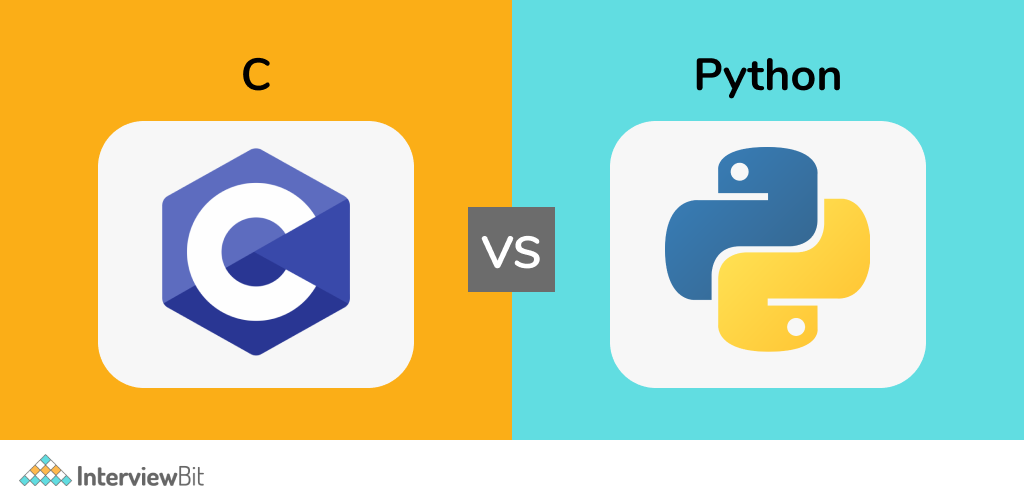One of the most frequently asked questions by people who have just started out their careers in the field of computer science or related fields is which programming language they should use. Well, there are a lot of programming languages that have been developed by people all round the globe over the years. However, there are two languages in particular which have seemed to attract coders a lot – C and Python.
While C was developed and released way before Python and had gotten a lot of attention during the time of its release, it seems that Python is more popular than C in today’s modern world because of a lot of reasons. Therefore, it is important for all coders or developers to know what are the differences between C and Python so that they can take the right step in their coding career by picking a language of relevance. Through this article, we try to give an introduction to both these programming languages C and Python, and also highlight the key differences between the two.
Introduction to C
C was developed at Bell Labs by Dennis Ritchie between the years 1972 and 1973. C is one of the oldest general purpose programming languages of all time and it was developed to construct utilities running on Unix and was applied to re-implement the kernel of the Unix operating system. In the modern world, C finds its application in the development of a number of firmware and portable systems. C supports a plethora of features like structured programming, lexical variable scope, and recursion, with a static type system, etc.
Confused about your next job?
C is also known as a middle level language as it combines the features of both high level languages (programming languages that enable programmers to write programs that are more or less independent of a particular type of computer) and low level languages (programming languages that provides little or no abstraction from a computer’s instruction set architecture, that is, commands or functions in the language map that are structurally similar to processor’s instructions). C is a procedural language that has a lot of features like structured programming, lexical variable scope, pointers, etc. due to which it gained a lot of attraction during the time of its release.
Key Features of C
Let us now have a look at some of the most important features of C:-
- C is a structured programming language (structured programming is a programming paradigm aimed at improving the clarity, quality, and development time of a computer program by making extensive use of the structured control flow constructs of selection statements like if, then, else and repetitive statements like while and for, block structures, and subroutines) which is extremely easy to learn.
- It is an efficient programming language, that is, it is fast and has very good performance as it is a compiled language.
- C is a highly portable and extensible programming language because it is not tied to any hardware or system. Any code written in C can be run on any machine which supports C, without modifying a single line of code.
- C has a rich set of built-in Operators and libraries with functions.
- C is a modular language, that is, it emphasizes on separating the functionality of a program into independent, interchangeable modules, such that each contains everything necessary to execute only one aspect of the desired functionality.
Introduction to Python
One of the most promising languages of the upcoming times, Python is a general purpose high level language which is interpreted. Python was first released in 1991 as a successor to the ABC programming language. One of the most striking features of Python is its indentation that has been emphasized a lot to improve code readability. Python supports a lot of programming paradigms, for instance, Object Oriented Programming, Functional Programming, Structured Programming, etc.
Python is dynamically-typed and garbage-collected. Due to the plethora of features which Python offers, it is one of the most in demand programming languages and has its application in a variety of fields like Software Engineering, Data Science, for instance, in Machine Learning, Deep Learning, etc. It is extremely user friendly and is therefore, due to the ease with which Python code can be written, Python is being adopted by a lot of developers nowadays as their primary programming language.
Key Features of Python
Let us now have a look at some of the most important features of Python:-
- Python is a very simple, readable open source programming language which is extremely easy to learn.
- Python is an interpreted language and not a compiled language.
- Python also supports the Object Oriented Programming Model.
- Python is platform independent and easily extensible and embeddable.
- It has a huge standard library with lots of modules and packages which support a lot of common and important functionalities. Python has one of the largest communities on StackOverflow and Meetup.
- Python is a high level language as it is easy to use because of simple syntax, powerful because of its rich libraries and extremely versatile.
Key Differences
Before taking a deep dive into all the differences between C and Python, let us take a look at some of the most basic yet remarkable differences between the two programming languages. Firstly, C is a compiled language while Python is an interpreted language. Python is an Object Oriented Programming language (a programming model which is based upon the concept of objects, in which all the entities are represented as objects) while C is a Structured, Procedure Oriented Programming language (a programming model which can be said to be derived from structured programming, based upon the concept of calling procedures or functions).
Also, C is predominantly used in the development of firmware and portable systems where high speed and high performance are of utmost priority. On the other hand, Python is a general purpose programming language which has found its application in a variety of fields like Software Engineering, Data Science, etc.
Differences Between C and Python

Let us now dive deep into all the differences between C and Python to evaluate which one is better in the competition: C vs Python.
| Comparison Parameter | C | Python |
| Developed / Founded by | The C programming language was developed by Dennis M. Ritchie in 1972. | The Python programming language was first worked upon by Guido van Rossum and was released in the year 1991. |
| Programming model | C is a procedural programming language | Python is an object oriented programming language. |
| Type of language | C is a middle level language as it binds the bridges between machine level and high level languages. | Python is a high-level language as the translation of Python code takes place into machine language, using an interpreter. |
| Compilation and Interpretation | C is a compiled programming language. Special programs known as compilers check the C code line by line and if any error is found on any line, the program compilation stops then and there. | Python is an interpreted programming language. Special programs known as interpreters check the entire Python code and all the errors in the entire Python code is reported at once. |
| Speed | C is a faster language compared to Python as it is compiled. | Python programs are usually slower than C programs as they are interpreted. |
| Variable Declaration | In C, the type of the various variables must be declared when they are created, and only values of those particular types must be assigned to them. | In Python, variables are untyped, that is, there is no need to define the data type of a variable while declaring it. A given variable in Python can store values of different data types in different parts of the Python code. |
| Memory Management | Memory management needs to be done manually in C. | Memory management is automatically handled in Python by the Garbage Collector provided by it. |
| Pointers | C has support for pointers. | Python has no support pointers. |
| Functional Units | In C, mostly the functional units are functions as it is a procedural programming language. | In Python, mostly the functional units are objects as it is an object oriented programming language. |
| Robustness | C is a less robust programming language compared to Python. | Python is a more robust programming language compared to C as it has strong memory management schemes. |
| Applications | The C programming language is mostly used for the development of hardware applications. | Python is a general purpose programming language |
| Built-in functions | The number of built-in functions in C are very limited. | There are a lot of built-in functions in Python. |
| Usage of Data Structures | To use various data structures like stacks, queues, etc. in C, we need to implement them on our own. | It is easier to use Data Structures in Python as it provides built in libraries for the same. |
| In line assignment. | C allows inline assignment. For instance: int a = 5; runs well in C. | Python does not allow inline assignment. For instance, a = 5; throws an error in python. |
| Type of file | C codes are stored with .c extension. | Python codes are stored with .py extension. |
Pros and Cons of C
Let us now take a look at some of the advantages of using C as a programming language:-
- C is a procedure oriented programming language which offers high speed of compilation.
- The C language is extremely easy to understand as its syntax is very simple.
- It has support for a lot of built-in libraries.
- C supports a lot of features like structured programming, recursion, pointers, structures, etc. which makes it simpler to solve a lot of problems.
- C codes can be easily extended. A lot of programming languages like C++, Python, etc. have been created with C codes as their foundations.
Let us now take a look at some of the disadvantages of using C as a programming language:-
- One of the drawbacks of C is that it does not support Object Oriented Programming.
- C does not support run time polymorphism.
- There is no concept of automatic garbage collection in C. Garbage Collection in C is done manually.
- C is somewhat a small and core machine language that offers minimum data hiding and exclusive visibility. This has a major impact on the security of this language.
- Since C is only compiled and is not interpreted, errors or bugs cannot be detected after every line of code.
Pros and Cons of Python
Let us now take a look at some of the advantages of using Python as a programming language:-
- Python is portable (computer programming language capable of developing software for more than one computer system) and interactive.
- Python is ideal for prototyping as it provides more functionality with very few lines of code.
- It is very versatile, easy to read, learn and write with a great community support.
- It has extensive support for libraries, for instance, NumPy for numerical calculations, Pandas for data analytics, etc.
- Python is free and open source.
Let us now take a look at some of the disadvantages of using Python as a programming language:-
- Python has speed limitations (as it is interpreted) and is generally slower compared to compiled languages like C and C++.
- Multithreading causes problems in Python due to the Global Interpreter Lock (GIL). GIL is nothing but a mutex which allows only one thread to execute at a time due to which, multi threaded CPU bound programs are not as fast as the single threaded ones.
- Python is not native to the mobile environment and therefore, it can be seen as a weak language for mobile computing. Android and iOS don’t support Python as an official programming language.
- Python’s memory consumption is very high.
- Python also has its limitations with Database Access. Python’s database access layer is primitive and underdeveloped in comparison to the popular technologies like JDBC (Java DataBase Connectivity) and ODBC (Open Database Connectivity).
C or Python: Which is better?
This is a question which may have different answers for different scenarios and different applications. If the programming language needs to give better performance and has to be used in systems where high speed and performance are of utmost value, then probably C is a better choice than Python. However, Python is a general purpose language which can be used for the ease of development and in problems where code reusability is of great value. In other words, if there are standard libraries or important functionalities which need to be used again and again, then Python might prove to be the better choice between the two programming languages.
Conclusion
So, in conclusion,we would like to mention that both the languages C and Python are being used a lot by big Software Companies and therefore, learning both of them could prove to be extremely useful. For the budding coders of today who are looking forward to taking a job in the Software Industry, or already have a Software Engineering Job, it is better to learn more about Python because of the diversity and flexibility it provides. Also, Python is being extensively used by Data Scientists. However, for people looking to work on building firmware systems, gaming engines, etc. where high performance is needed, C can certainly prove to be a better choice of programming language than Python as it is way faster than Python.
Frequently Asked Questions
Q: Why is C faster than Python?
Answer: The fact that Python is an interpreted language and every action in the code needs to be interpreted by the main CPU to perform what is required makes Python slower than C. Python is run on what is called a Virtual Machine. This is the process that does the bytecode interpretation to make what you’ve written into something that can be read at the machine level. On the other hand, C is a compiled language. This means that the C code gets translated into machine code before running instead of at runtime like Python.
Q: Which is more popular, C or Python?
Answer: Python is more popular in today’s world than C.
Q: Should I learn C or Python first?
Answer: It mostly depends upon the use case of the user. If one wants to develop applications where high speed and performance are of utmost concern, then C is a better choice. However, in most of the other use cases like for Natural Language Processing, Software Engineering, Machine Learning, etc. Python can be the preferred option because of the rich libraries it provides.
Q: Can I learn Python without knowing C?
Answer: Yes, one can learn Python without having any knowledge of C. Here is a free Python course by Scaler Topics you can check out if you are interested in learning Python.
Q: Is Python made from C?
Answer: Yes, Python had its foundations laid on the C programming language.




